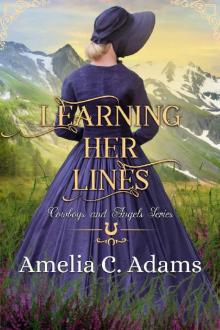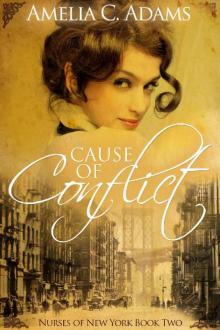- Home
- Amelia C. Adams
An Agent for Lucy
An Agent for Lucy Read online
An Agent for Lucy
The Pinkerton Matchmaker Series Book One
by Amelia C. Adams
With thanks to my beta readers—Dorothy, Joseph, Mary, Meisje, Melissa, and Shelby.
I’d also like to thank the other authors in this project. What a great bunch of ladies you are!
Copyright 2018 © Amelia C. Adams
Cover design by Virginia McKevitt
Come join us at the Pinkerton Matchmaker Readers Group on Facebook!
Table of Contents:
Chapter One
Chapter Two
Chapter Three
Chapter Four
Chapter Five
Chapter Six
Chapter Seven
Chapter Eight
Chapter Nine
Chapter Ten
Chapter Eleven
Chapter Twelve
Chapter Thirteen
Chapter Fourteen
Chapter Fifteen
Chapter Sixteen
Chapter Seventeen
Don’t miss the prequel to this exciting series!
Chapter One
Pacific Ocean
1871
“Lucy? Oh, there you are! I’ve been looking everywhere for you.”
Lucy Haskell turned at the sound of the voice and smiled. “I can’t have gotten too far away, not on a ship at sea.”
Delphine Collins chuckled, her double chin wiggling as she did so. “Of course not. That would be quite a tragedy otherwise, but a treat for the sharks.” A look of horror crossed her face. “Oh, dear. I’m getting rather morbid. Too many weeks of such limited entertainment, I suppose.” She joined Lucy at the railing and looked out across the water. The sapphire blue on which they traveled extended on all sides as far as they could see. White-tipped ripples frosted the surface from time to time, breaking up the endless expanse. It was breathtaking.
Lucy understood perfectly well what Mrs. Collins meant. Their journey from China felt as though it had taken decades even though it had been just weeks, and she was ready to set her feet on solid ground again. She’d lived in China for so long, however, that she was nervous to return to the States. Four years was enough to change a person entirely, and she knew she wasn’t the same person she’d been when she left.
“Have you talked Mr. Collins into taking you on a tour of California before you continue on your way?” she asked.
“Yes, but he never did stand much of a chance, did he?” Mrs. Collins giggled. “I told him it was the least he could do after making me leave home and traipse all over the world. Don’t misunderstand me, my dear—I’m ever so grateful that your father asked him to be his business partner in this trade endeavor, but I didn’t realize that meant I’d become such a seasoned traveler by the end of it.”
Lucy hid a smile. It was true that going into business with her father had required the Collins’ to journey quite a distance, but Mrs. Collins most certainly was not seasoned. She spent the first three days of any ocean journey green to the gills in her bunk, and she gawked and fawned over all the new sights just like any tourist.
“Will you be touring California, my dear?” Mrs. Collins asked.
“I’m afraid not. Father wants to get back to Denver as soon as possible. With all the silks and spices we’ve brought with us, he’s anxious to set things to rights in the warehouse.”
“And you couldn’t send him ahead and travel with us? We’ll be just a few weeks behind you, after all.”
That was an interesting thought. Mrs. Collins had become a dear friend to Lucy over the last four years, stepping in and soothing the hurt when Lucy’s mother had died their first spring in China. It had been Mrs. Collins who had overseen Lucy’s education in the feminine arts of embroidery and cooking, had giggled with her over romantic novels, and had chaperoned her in society. All the things Mrs. Haskell should have done, Mrs. Collins had done instead, and she felt connected to the woman as though she was another mother. However, Lucy knew where her duty lay.
“I’m sorry, Mrs. Collins, but Father was telling me just last night how much he needs my help at home. He’s actually thinking of making me a manager in his company.”
Mrs. Collins’ eyes grew wide. “A manager? My goodness! That’s not something you hear every day—a young woman with such a responsible position. I can see why you wouldn’t want to delay getting started.”
“And it’s also Father,” Lucy went on. “He’s not as young as he was when we first left—losing Mother was hard on him, and I don’t believe he’s ever recovered. He’ll be so tired by the time we get home.”
Mrs. Collins put her hand on Lucy’s arm. “I understand, my dear. I truly do. You must go home and help him set everything to rights. We’ll be along shortly. I doubt I could talk Abner into more than a few weeks of sightseeing, and the men are anxious to discuss their next venture.”
“I just hope that whatever it is, we’ll get to keep our feet on solid ground for a little while,” Lucy replied with a chuckle. “This constant rocking motion has worn my nerves clean through.”
“Believe me, my dear, I understand. When we get home, I plan to take to my parlor sofa for a week at least. I imagine it will take that long for me to stop feeling as though everything is moving beneath me.”
They had just one more night left at sea, and Lucy spent that night mostly awake, thinking and anticipating. She had been sixteen years old when her father announced his plan to travel to the Orient to explore new merchandise for his importing and exporting business, and she’d detested the idea of going with him. She had a circle of friends and another of beaus, and she argued that she could stay with her aunt and send her parents ahead. But her mother insisted that they travel together, and now Lucy was so glad she did. If Lucy had stayed behind and missed saying goodbye to her mother on her deathbed, she would never have forgiven herself.
And now she couldn’t imagine sending her father ahead while she remained behind. Touring California with the Collins would be a great deal of fun, but she refused to be separated from her father that long. Her heart couldn’t handle it.
Denver, Colorado . . . the place where she’d been born and raised. She wondered how much it had changed, and if the young men who had lined up to dance with her at each party were all married. She supposed she was an old maid now, twenty years old and without a serious beau. One or two of the young British clerks her father had employed in China had been pleasant to her, but that was as far as their interest went—they didn’t want to risk their jobs by offending their employer’s daughter, and it was safest to keep their distance. She sighed, rolling over. They had kept so much distance, she had felt quite rejected and alone.
But things would be different now, wouldn’t they? She’d have the chance to meet someone who didn’t work for her father and who wasn’t concerned about losing his job if he spent time with her. She might have the opportunity to marry after all. She’d help her father incorporate the new merchandise into his inventory, arrange for buyers, and establish a regular trade route, and then she’d turn the reins over to someone else and retire in a little white house with a dozen babies and a husband who whistled while he polished his boots. That would be heaven.
She had just drifted off when dawn crept in her stateroom window, and she flung her arm across her eyes. She had known the whole time she lay there awake that she would be good for nothing if she didn’t get some sleep, but her insomnia hadn’t been by choice. She’d tried over and over again to make her brain stop churning, but it roiled just as surely and steadily as the water beneath the ship, making sleep impossible. Now it was time to get up, and she felt as though her head had been stuffed with bales of cotton.
She dressed hurriedly, then moved over to her trunk,
lifting the lid. She had done most of her packing the day before, leaving just the necessities out to be used that morning. She laid her nightgown on top, followed by her brush after she pinned her hair into place. She left out her cape, not knowing if the day was likely to be chilly, and of course her reticule, but everything else went inside, leaving her dresser drawers empty. It was frightening in a way, knowing that this chapter of her life had come to an end and it was time to start a new one.
She lowered the lid of the trunk, but found that it wouldn’t close all the way on its own.
“Bother,” she muttered. She thought she’d arranged things so they’d fit, but she had done a little shopping at some of the ports along the way—she couldn’t help it. She might never travel that way again, and there were curiosities galore everywhere she looked. Not to mention the bright, shining eyes of the little children whose job it was to charm potential customers. They had been very successful at their task, and now her trunk was paying the price for it.
She pushed down on the lid again, but the infernal thing kept popping open, creating a gap of about two inches. “You haven’t got the best of me,” she said aloud, hoisting up her skirts so she could sit on the lid and force it into place.
As soon as she plunked down, though, the ship listed to the side, and she tumbled off, hitting the floor with a most ungraceful thunk with her legs jutting out in front of her.
“Lucy? Are you all right?” Her father, Edwin Haskell, was in the adjoining room, and he must have heard her connect with the floor.
“I’m all right, Father. Just caught off guard.”
He knocked once, then entered, and she scrambled to pull herself upright and look more dignified. He looked amused, probably able to guess that she’d taken a tumble. He was always chiding her to be more ladylike and had been quite pleased when Mrs. Collins had taken a hand with her, but he must have known that grace was still as foreign to her as some of the lands they’d visited.
He didn’t comment on that, though. “I see that you’re nearly ready. Having problems with your trunk?”
“Just one—it won’t close those last few inches.”
“Let me give you a hand.” He pushed the lid down and held it while she fastened the buckles. “There we are. So, what do you think? We’re almost home. Are you excited?”
Lucy chuckled. “We’re almost ashore, but we’re still a long way from home, Father. Or have you forgotten about the train ride between here and there?”
“Perhaps I’m choosing to forget it. You know how much I dislike traveling by train.”
“Which makes me ask you again—why are we keeping the house in Denver? Doesn’t it make more sense for us to move to California, where you’ll be near the docks? With the business you’re in, and now branching out to international trade—”
He held up a hand. “Yes, I know,” he said, sounding tired. “My choice must seem foolish and illogical, and perhaps someday I’ll change my mind. But for now . . .” He pressed his lips together. “The last time I was in that house, your mother was there, and now she’s no longer with us. I need to walk through those rooms again and imagine her there at least once more.”
Tears sprang to Lucy’s eyes. “I’m sorry I’ve pressed you about it,” she said, placing her hand on his arm. “I didn’t realize. You haven’t spoken about her much since she passed.”
“I haven’t known what to say, and I didn’t want to make your grief worse, my dear. The truth is, your mother was incredibly special to me, and without her, I’m lost.” He patted her hand. “Thank you for your concern. We’ll muddle through somehow, won’t we?”
“Of course we will, Father. And I won’t ask about moving again.”
He smiled. “Oh, I’m sure we’ll move at some point. It’s the most logical thing to do, after all, and will save us quite a bit of train travel. Just not now. Not until I’ve had the chance to lay some memories to rest.”
Just then, the boat gave another lurch, and Lucy reached out to steady herself on the wall. “What on earth is going on out there?”
“I imagine they’re bringing the ship into the dock. There’s always a bit of thumping and bumping as they’re setting things to rights.”
“Well, I wish they’d get it straightened out. I’m no good at keeping my balance.”
Her father laughed. “Neither was your mother, my dear, but that was one of the things I found the most endearing about her. She was completely artless.”
They stood for a moment, each lost in their thoughts. Claire Haskell had been everything her husband said, and the dearest mother who had ever lived. As difficult as it had been to lose her, it had been even harder to leave her buried in the Chinese soil. It was almost like losing her twice. If only there had been a way to transport that piece of land back to their home so she could always be near them . . . but that was impossible, and Lucy knew she was being silly to imagine such a thing.
“And so we’ll muddle through,” her father said again, and Lucy smiled and nodded. It was all they could do, really. Until time took away the sting and all they were left with were the fond memories, muddling through was the choice they were given.
The porter came around a short time later and collected Lucy’s trunk. She glanced around again one more time just to make sure she wasn’t leaving anything behind, and then she made her way up to the deck. The ship had indeed pulled up to the dock, but the gangplank had not been put in place, and the passengers milled about, waiting to be told it was time to be freed from their imprisonment.
“Oh, this is so exciting,” Mrs. Collins said, coming to stand next to Lucy. “I’ve been dreaming of this day, and now that it’s finally here, I hardly know what to do with myself. Part of me wants to jump up and down and squeal like a little girl. I don’t think Abner would like that, though.” She nodded over at Mr. Collins, who stood next to Lucy’s father a few yards away.
“Most likely not, but he wouldn’t begrudge you your feelings of happiness,” Lucy said. Abner Collins was a good man who cared deeply about his wife, even if he did sometimes try to bottle up her exuberance. After thirty years of marriage, he should have realized that she was not one to be bottled, and yet he still tried—not out of meanness, but merely because he himself was so much more reserved.
The gangplank was finally set into place, and after a moment of trying to set things to rights, the porters allowed the passengers to descend. Lucy grinned when her feet hit the dock. Solid ground . . . and she was home.
Chapter Two
Denver, Colorado
Pinkerton Agent Jed Green ducked into the nearest alley, hoping he hadn’t been seen. The man he’d been following had gone into a building across the street, the one where Miss Scarlett LeVeau lived. If his luck held, Jed would soon have evidence that he’d found Gerald Fields.
Mr. Fields had gone missing two months previously, and when Mrs. Fields lost her patience with local law enforcement, she had come to the Pinkerton Detective Agency. Jed had been on task since the first day, and after running into countless dead ends, he now believed he was ready to solve the case. He just needed a closer look at this mystery man, compare him to a photograph he’d been shown, and check for a small identifying scar on his chin.
Jed slumped against the bricks of the alley wall, knowing he might have a long wait ahead of him and trying to get as comfortable as possible. This wasn’t what he’d envisioned when he signed on with the agency. His education and experience had fitted him for international travel, but he hadn’t stepped one toe out of Denver in over a year. Patience, he kept telling himself. In time, maybe he’d head up an office of his own. Maybe he’d even set up the first international office of the Pinkertons. That would be something else for sure.
The man he believed to be Gerald Fields finally exited the building and strode down the sidewalk, swinging his cane with every step. He appeared to weave a bit from side to side, but it was late, and if he’d been visiting Miss LeVeau, chances were good that drinking had been
involved.
This was where things became tricky. As the man passed under a streetlight, Jed saw enough of his face to be sure it was indeed Mr. Fields, even though he couldn’t make out the scar at such a distance. The man had been found. However, he’d been found in a compromising location, and the Pinkertons did not associate themselves with scandal. Knowing what he did now, Jed wasn’t sure they should have taken the case, but then again, he’d had no idea where the man would actually be found. He’d let Archie Gordon, the lead agent in the office, sort through the details and figure out how to handle it.
He turned, ready to step out of the alley and go home, but he found his way blocked by two men in dark suits.
“Excuse me, gentlemen,” he said, nodding. He stepped to the left, thinking to go around them, but they moved as well, keeping him from advancing.
“We’d like to have a word with you before you run off,” one of the men said. His voice gave him away as being a New Yorker.
“A word about what, might I ask?”
“Well, you see, we just so happened to notice that you were paying particular attention to our friend. And we wondered just why you might be so interested in him.”
“I’m afraid you’re mistaken. I was waiting for a friend of my own.”
The two men looked at each other and laughed. “He was waiting for his friend,” the first man said. “Because a dark alley in the middle of the night is the perfect place to meet up with friends.”
“I very much enjoy meeting my friends in dark alleys,” the other man replied. “I do it all the time.”
They chuckled again, but then turned back to Jed with all the mirth gone from their faces. “We’ve been following you this whole evening, Mr. Whoever You Are, and we’re very aware of what you’re doing. Why don’t you go back and report that there’s nothing going on here—nothing whatsoever. And then you can be on your merry way, and we’ll all be happier.”

 Honoring Her Heart
Honoring Her Heart Buttons and Bows
Buttons and Bows An Agent for Emily
An Agent for Emily Christmas Catch-Up VIII (River's End Ranch)
Christmas Catch-Up VIII (River's End Ranch) A Rancher for Rowena
A Rancher for Rowena Candice (Seven Sisters Book 6)
Candice (Seven Sisters Book 6) Butterfly Kisses
Butterfly Kisses A Stitch in Time
A Stitch in Time Buttons and Bows (The Sewing Circle Book 3)
Buttons and Bows (The Sewing Circle Book 3) Sidearms and Songbirds (Hearts of Nashville Book 3)
Sidearms and Songbirds (Hearts of Nashville Book 3) Herd to Breathe
Herd to Breathe The Ties That Bind
The Ties That Bind Rhyme or Reason
Rhyme or Reason Revelations (Brody Hotel Book 4)
Revelations (Brody Hotel Book 4) Phoebe's Fate (Burnt River Contemporary Western Romance Book 9)
Phoebe's Fate (Burnt River Contemporary Western Romance Book 9) And Something Blue (Main Street Merchants Book 1)
And Something Blue (Main Street Merchants Book 1) Learning Her Lines
Learning Her Lines Connections
Connections The Turn of a Wheel (Kansas Crossroads Book 17)
The Turn of a Wheel (Kansas Crossroads Book 17) Just Desserts (Main Street Merchants Book 4)
Just Desserts (Main Street Merchants Book 4) An Agent for Anna
An Agent for Anna An Agent for Esme
An Agent for Esme A Handyman for Helen
A Handyman for Helen Scented Sensibility
Scented Sensibility Addie's Adventurer
Addie's Adventurer Defying the Darkness
Defying the Darkness Riding the Rails
Riding the Rails Sugar And Spice (Main Street Merchants Book 7)
Sugar And Spice (Main Street Merchants Book 7) An Agent for Cynthia
An Agent for Cynthia In The Stars (Main Street Merchants Book 6)
In The Stars (Main Street Merchants Book 6) Moonlight With Alice (The Matchmaker's Ball Book 3)
Moonlight With Alice (The Matchmaker's Ball Book 3) Five Golden Rings (Main Street Merchants Book 3)
Five Golden Rings (Main Street Merchants Book 3) Between The Lines (Main Street Merchants Book 5)
Between The Lines (Main Street Merchants Book 5) An Agent for Lucy
An Agent for Lucy Jessica (Seven Sisters Book 2)
Jessica (Seven Sisters Book 2) A Passing Glance
A Passing Glance Pet Peeves
Pet Peeves RNWMP: Bride for Joel
RNWMP: Bride for Joel Bowing to Betsy (The Matchmaker's Ball Book 11)
Bowing to Betsy (The Matchmaker's Ball Book 11) Rebekah (Seven Sisters Book 4)
Rebekah (Seven Sisters Book 4) A Joyful Noise (Kansas Crossroads Book 14)
A Joyful Noise (Kansas Crossroads Book 14) Her Second Chance Hometown Groom
Her Second Chance Hometown Groom A Christmas Promise (Kansas Crossroads Book 16)
A Christmas Promise (Kansas Crossroads Book 16) Bride for Samuel
Bride for Samuel Bribing the Blacksmith (Cowboys and Angels Book 9)
Bribing the Blacksmith (Cowboys and Angels Book 9) RNWMP: Bride for Samuel (Mail Order Mounties Book 12)
RNWMP: Bride for Samuel (Mail Order Mounties Book 12) Tea for Two
Tea for Two The Bitter and the Sweet (Kansas Crossroads Book 9)
The Bitter and the Sweet (Kansas Crossroads Book 9) Frank (Seven Sons Book 6)
Frank (Seven Sons Book 6) A Cattleman for Cora
A Cattleman for Cora Paislee's Path (River's End Ranch Book 48)
Paislee's Path (River's End Ranch Book 48) Accidental Agent (River's End Ranch Book 3)
Accidental Agent (River's End Ranch Book 3) Test of Time (Nurses of New York Book 5)
Test of Time (Nurses of New York Book 5) RNWMP: Bride for Michael (Mail Order Mounties Book 24)
RNWMP: Bride for Michael (Mail Order Mounties Book 24) Loving the Landlord
Loving the Landlord The Dark and the Dawn (Kansas Crossroads Book 3)
The Dark and the Dawn (Kansas Crossroads Book 3) Candy Crush
Candy Crush Tabitha: Bride of Missouri (American Mail-Order Bride 24)
Tabitha: Bride of Missouri (American Mail-Order Bride 24) Touch of Tenderness (Nurses of New York Book 3)
Touch of Tenderness (Nurses of New York Book 3) Lucky Lifeguard (River's End Ranch Book 28)
Lucky Lifeguard (River's End Ranch Book 28) Heartstrings (Brody Hotel Book 2)
Heartstrings (Brody Hotel Book 2) Heart of Hearts (Nurses of New York Book 4)
Heart of Hearts (Nurses of New York Book 4) Hope_Bride of New Jersey
Hope_Bride of New Jersey A Careless Wind (Kansas Crossroads Book 7)
A Careless Wind (Kansas Crossroads Book 7) An Agent for Emily (The Pinkerton Matchmaker Book 28)
An Agent for Emily (The Pinkerton Matchmaker Book 28) A Twisted Fate
A Twisted Fate Delivering Destiny (River's End Ranch Book 23)
Delivering Destiny (River's End Ranch Book 23) Tabitha_Bride of Missouri
Tabitha_Bride of Missouri A Wrangler for Wynonna
A Wrangler for Wynonna RNWMP_Bride for Peter
RNWMP_Bride for Peter An Unspoken Dream (Kansas Crossroads Book 13)
An Unspoken Dream (Kansas Crossroads Book 13) Generations
Generations Utah Sunrise (Rocky Mountain Romances Book 1)
Utah Sunrise (Rocky Mountain Romances Book 1) Bride for Jonathan
Bride for Jonathan Bribing the Blacksmith
Bribing the Blacksmith A Clean Slate (Kansas Crossroads Book 4)
A Clean Slate (Kansas Crossroads Book 4) Hope: Bride of New Jersey (American Mail-Order Brides 3)
Hope: Bride of New Jersey (American Mail-Order Brides 3) Rugged Rockclimber (River's End Ranch Book 8)
Rugged Rockclimber (River's End Ranch Book 8) RNWMP_Bride for Michael
RNWMP_Bride for Michael RNWMP: Bride for Joel (Mail Order Mounties Book 4)
RNWMP: Bride for Joel (Mail Order Mounties Book 4) Tea For Two (Cowboys & Angels Book 15)
Tea For Two (Cowboys & Angels Book 15) Sweet Georgia Peach
Sweet Georgia Peach RNWMP: Bride for Peter (Mail Order Mounties Book 20)
RNWMP: Bride for Peter (Mail Order Mounties Book 20) A Clear Hope (Kansas Crossroads Book 5)
A Clear Hope (Kansas Crossroads Book 5) Meredith's Mistake (Grandma's Wedding Quilts Book 4)
Meredith's Mistake (Grandma's Wedding Quilts Book 4) RNWMP_Bride for Samuel
RNWMP_Bride for Samuel The Whisper of Morning (Kansas Crossroads Book 6)
The Whisper of Morning (Kansas Crossroads Book 6) RNWMP: Bride for Jonathan (Mail Order Mounties Book 8)
RNWMP: Bride for Jonathan (Mail Order Mounties Book 8) Santa's Shopkeeper (River's End Ranch Book 18)
Santa's Shopkeeper (River's End Ranch Book 18) A Broken Wing (Kansas Crossroads)
A Broken Wing (Kansas Crossroads) Cause of Conflict (Nurses of New York Book 2)
Cause of Conflict (Nurses of New York Book 2) A Free Heart
A Free Heart A New Beginning
A New Beginning The Calm of Night (Kansas Crossroads Book 10)
The Calm of Night (Kansas Crossroads Book 10) Bride for Calvin
Bride for Calvin Sea of Strangers (Nurses of New York Book 1)
Sea of Strangers (Nurses of New York Book 1)